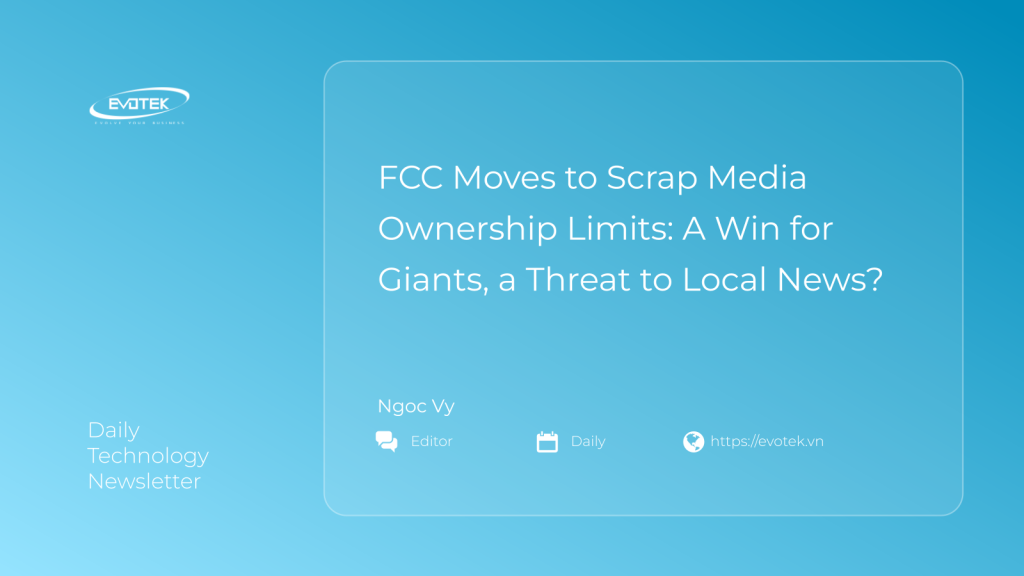The Federal Communications Commission (FCC), under Chairman Brendan Carr, has initiated a process to dismantle long-standing media consolidation limits. This controversial move, widely seen as a reward for powerful media conglomerates like ABC and Disney, threatens to reshape the American media landscape, potentially at the expense of local journalism and diverse voices.
This latest FCC push follows a period where major networks, including ABC, have been observed aligning closely with the previous administration. Notably, ABC faced significant backlash, including a reported loss of 1.7 million streaming subscribers, after banning a comedian critical of the former President – an action many viewed as undermining free speech principles. This perceived appeasement also followed a substantial $15 million settlement paid to the former President by ABC in a lawsuit they were widely expected to win. These actions, critics argue, were strategic maneuvers to curry favor and pave the way for deregulation beneficial to their business interests.
For years, media executives, including those at ABC and its affiliates, have openly lobbied for the FCC to relax or eliminate U.S. media consolidation limits. These limits, established over decades with bipartisan support, were designed to prevent media ownership from falling into the hands of a few powerful entities, thereby protecting journalistic diversity and preventing a homogenized, less accountable press.
Now, these companies appear poised to achieve their goal. Chairman Brendan Carr has initiated a Notice of Proposed Rulemaking (NPRM) to eliminate crucial remaining media ownership restrictions. Specifically, the proposal targets the Local Radio Ownership Rule, which caps the number of radio stations a single entity can own in a local market, and the Local Television Rule, preventing one company from owning more than two TV stations in the same local market. Such changes could also pave the way for previously restricted media mergers among the major broadcast networks, including ABC, CBS, NBC, and Fox.
While the FCC’s process involves soliciting public comment, critics are skeptical about its impact. Past experiences suggest that genuine public sentiment is often overshadowed by orchestrated campaigns of “fake support” from corporate PR departments, designed to manufacture consensus for deregulation regardless of public backlash.
Chairman Carr justifies these proposed changes by arguing that traditional broadcast ownership rules are outdated in today’s competitive online media landscape. He points to the proliferation of online audio and video streaming services as evidence that the marketplace has fundamentally changed, rendering existing broadcast ownership restrictions unnecessary.
However, this argument overlooks decades of compelling evidence demonstrating the profound harms of media consolidation, irrespective of whether it occurs in traditional or new media sectors. The erosion of oversight has consistently led to a less diverse, often billionaire-owned press that struggles to provide critical, independent journalism, particularly in times demanding robust public discourse.
The push for deregulation is strongly supported by large local broadcast groups, such as Sinclair Broadcast Group, which already operates 185 television stations across 85 markets and openly seeks to merge with other major players like Nexstar and Tegna. These groups, often criticized for injecting partisan content into local news, aim to dominate the remaining local broadcasting market. Despite the rise of online video, millions of Americans still rely on local broadcast news, especially as local newspapers continue to decline. Unchecked consolidation here further exacerbates the problem of “news deserts,” leaving communities without access to reliable, accurate local journalism.
This drive for consolidation extends beyond local markets. National conglomerates like ABC and Disney are reportedly eyeing mergers not only with each other but also with modern digital powerhouses such as TikTok. This trend indicates a broader ambition across telecom, tech, and media sectors to consolidate power and market share.
The underlying motivations behind these extensive acquisition strategies rarely appear to align with serving the public interest. Instead, the clear objective often seems to be stifling diverse opinions, undermining independent journalism, and fostering a media landscape saturated with corporatist narratives and partisan propaganda. Recent high-profile acquisitions, such as Elon Musk’s takeover of Twitter (now X), offer stark examples of these shifts.
To claim that the internet’s competitiveness justifies eliminating the last safeguards of media oversight and antitrust enforcement is, for many experts, a disingenuous argument. Such claims serve as a thin veil for the very type of harmful media consolidations that academics have warned about for generations, risking profound implications for democratic discourse and information access.
The irony is palpable: one of the most significant consequences of media consolidation – the erosion of quality journalism that is critical of corporate power – may well ensure that mainstream press outlets either downplay Chairman Carr’s actions or frame them in a positive light. It’s plausible that any genuine critique from media consolidation experts might only appear buried deep within an article, if at all.

 日本語
日本語 한국어
한국어 Tiếng Việt
Tiếng Việt 简体中文
简体中文